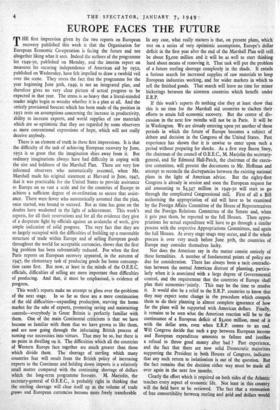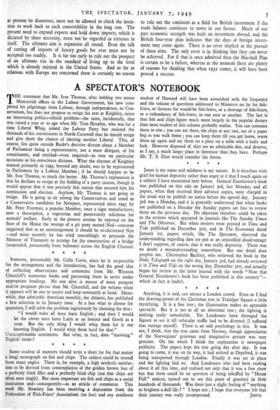EUROPE FACES THE FUTURE
THE first impression given by the two reports on European recovery published this week is that the Organisation for European Economic Co-operation is facing the future and not altogether liking what it sees. Indeed the authors of the programme for 1949-50, published on Monday, and the interim report on measures for securing independence of American aid by 1952, published on Wednesday, have felt impelled to draw a twofold veil over the scene. They stress the fact that the programme for the year beginning June 3oth, 1949, is not an integrated plan, and therefore gives no very clear picture of actual progress to be expected in that year. The stress is so heavy that a literal-minded reader might begin to wonder whether it is a plan at all. And the strictly provisional forecast which has been made of the position in 1952 rests on assumptions concerning the increase in productivity, ability to increase exports, and world supplies of raw materials which are so optimistic that they are regarded by some observers as mere conventional expressions of hope, which will not really deceive anybody.
There is an element of truth in these first impressions. It is that the difficulty of the task of achieving European recovery by June, 1952 is so great that the imagination shies away from it. But ordinary imaginations always have had difficulty in coping with the size and boldness of the Marshall Plan. There are very few informed observers who automatically assumed, when Mr. Marshall made his original statement at Han and in June, 1947, that it was practicable fcr the United States to provide assistance to Europe on so vast a scale and for the countries of Europe to achieve a sufficient degree of co-ordination to secure that assist- ance. There were fewer who automatically assumed that the plan, once started, was bound to succeed. But as time has gone on the doubts have weakened in the light of achievement. This week's reports, for all their reservations and for all the evidence they give of a desperate fight by officials against an avalanche of work, give ample indication of solid progress. The very fact that they are so largely occupied with the difficulties of building up a reasonable structure of trade within Europe and of selling European goods throughout the world for acceptable currencies, shows that the first big problem has been substantially reduced. For when the first Paris reports on European recovery appeared, in the autumn of 1947, the elementary task of producing goods for home consump- tion came first. But now, at least in the minds of the O.E.E.C. officials, difficulties of selling are more important than difficulties of producing. And that, it must be emphasised, is evidence of progress. • This week's reports make no attempt to gloss over the problems of the next stage. In so far as these are a mere continuation of the old difficulties—expanding production, starving the home. market for the sake of exports, promoting saving and maintaining controls—everybody' in Great Britain is perfectly familiar with them. One of the main Continental criticisms is that we have become so familiar with them that we have grown to like them, and are now going through the infuriating British process of turning our necessities into virtues. That may be so, but there is no point in dwelling on it. The difficulties which all the countries of Western Europe face together are much greater than those which divide them. The shortage of sterling which many countries fear will result from the British policy of increasing exports to the Continent and holding down imports is a relatively small matter compared with the continuing shortage of dollars which the long-term programme foresees. M. Marjolin, the secretary-general of O.E.E.C., is probably right in thinking that the sterling shortage will clear itself up as the volume of trade grows and European currencies become more freely transferable In any case, what really matters is that, on present plans, which rest on a series of very optimistic assumptions, Europe's dollar deficit in the first year after the end of the Marshall Plan will still be about $3,000 million and it will be as well to start thinking hard about means of removing it. That task will put the problem of a future sterling shortage completely in the shade. It entails a furious search for increased supplies of raw materials to keep European industries working, and for wider markets in which to sell the finished goods. That search will leave no time for minor bickerings between the nineteen countries which benefit under E.R.P.
If this week's reports db nothing else they at least show that this is no time for the Marshall aid countries to slacken their efforts to attain full economic recovery. But the centre of dis- cussion in the next few months will not be in Paris. It will be in Washington. We are already entering upon yet another of those periods in which the future of Europe becomes a subject of debate and decision in the Congress of the United States. Past experience has shown that it is unwise to enter upon such a period without preparing for shocks. As a _first step Baron Snoy, the chairman of the council of O.E.E.C., M. Marjolin the secretary- general, and Sir Edmund Hall-Patch, the chairman of the execu- tive committee, will present the documents to Mr. Hoffman and attempt to reconcile the discrepancies between the existing national plans in the light of American advice. But the eighty-first Congress is already in session and soon the European request for aid amounting to $4,347 million in 1949-5o will start to go through the complicated Congressional mill. First of all a Bill authorising the appropriation of aid will have to be examined by the Foreign Affairs Committee of the House of Representatives and the Foreign- Relations Committee of the Senate and, when it gets past them, be reported to the full Houses. Then appro- priations for actual expenditure will have to go through a similar process with the respective Appropriations Committees, and again the full Houses. At every stage snags may occur, and if the whole process is over very much before June 3oth, the countries of Europe may consider themselves lucky.
Nor does the American say in the matter consist entirely of these formalities. A number of fundamental points of policy are due for consideration. There has always been a tacit contradic- tion between the normal American distrust of planning, particu- larly when it is associated with a large degree of Governmental control, and the requirement that the countries of Europe shall plan their economies •jointly. This may be the time to resolve it. It would also be a relief to the E.R.P. countries to know that they may expect some change in the procedure which compels them to do their planning in almost complete ignorance of how far the plans will be supported with American dollars. Finally, it remains to be seen what the American reaction will be to the continuance of a European deficit of $3,000 million, most of it with the dollar area, even when E.R.P. comes to art end. Will Congress decide that such a gap between European income and European expenditure amounts to failure and justifies a refusal to throw good money after bad ? Past experience, and the fact that there are now solid Democratic majorities supporting the President in both Houses of Congress, indicates that any such return to isolationism is out of the question. But the fact remains that the decision either way must be made all over again in the next few months.
Clearly the effort which is required on both sides of the Atlantic touches every aspect of economic life. Not least in this country will the field have to be reviewed. The fact that a restoration of free convertibility between sterling and gold and dollars would at present be disastrous, must not be allowed to check the inten- tion to work back to such convertibility in the long run. The present need to expand exports and hold down imports, which is dictated by sheer necessity, must not be regarded as virtuous in itself. The ultimate aim is expansion all round. Even the talk of cutting off imports of luxury goods for ever must not be accepted too readily. It is far too early to rule out the prospect of an ultimate rise in the standard of living up to the level which is already enjoyed in the United States. And so far as relations with Europe are concerned there is certainly no reason to rule out the continent as a field for British investment if the trade balance continues to move in our favour. Much of our past economic strength was built on investment abroad, and the British four-year plan indicates that the days of foreign invest- ment may come again. There is no error implied in the pursuit of these aims. The only error is in thinking that they can never be achieved. For if that is once admitted then the Marshall Plan is certain to be a failure, whereas at the moment there are plenty of reasons for thinking that when 1952 comes, it will have been proved a success.







































 Previous page
Previous page